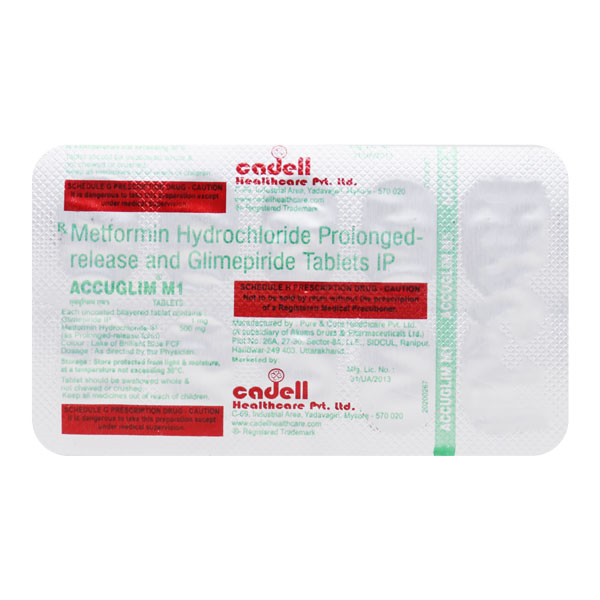ACCUGLIM M1 TABLET 10S – Better Control, Healthy Life
Key Features:
- Each tablet contains a combination of Glimepiride (1mg) + Metformin (500mg), a potent formula to help control high blood sugar.
- The Metformin component lowers hepatic glucose production, drastically reducing the blood sugar levels.
- Glimepiride increases the amount of insulin release from the pancreas, thus aiding in the efficient utilization of glucose.
- ACCUGLIM M1, being an oral anti-diabetic medication, offers easy consumption and is formulated to have prolonged effects.
₹75.00
Compare-
Product Introduction:
- Glimepiride: It belongs to the class of medications known as sulfonylureas. Glimepiride helps stimulate the release of insulin from the pancreas, which in turn helps lower blood sugar levels.
- Metformin: It belongs to the class of medications called biguanides. Metformin works by reducing the amount of glucose produced by the liver and improving the body’s response to insulin.
ACCUGLIM M1 TABLET should be taken with food. Take it regularly at the same time each day to get the most benefit. Your doctor will decide what dose is best for you and this may change from time to time according to how it is working according to your blood sugar levels.
Keep taking this medicine, even if you feel well or your blood sugar levels are controlled. If you stop it without consulting your doctor, your blood sugar levels could rise and put you at risk of kidney damage, blindness, nerve problems, and loss of limbs. Remember that it is only part of a treatment program that should also include a healthy diet, regular exercise, and weight reduction as advised by your doctor. Your lifestyle plays a big part in controlling diabetes.
The most common side effect of ACCUGLIM M1 TABLET is low blood glucose levels (hypoglycemia). Make sure you recognize the signs of having low blood glucose levels, such as sweating, dizziness, headache, and shaking, and know how to deal with it. To prevent this, it’s important to have regular meals and always carry a fast-acting source of glucose such as sugary food or fruit juice with you. Drinking alcohol can also increase your risk of low blood sugar levels and should be avoided. Other side effects that may be seen on taking this medicine include taste changes, nausea, diarrhea, stomach pain, headache, and upper respiratory tract infection. Some people may find that they put on weight with this medicine.
You should not take it if you have type 1 diabetes mellitus, if you have diabetic ketoacidosis (high levels of acid in your blood), or if you have severe kidney or liver disease. Before taking this medicine, tell your doctor if you have ever had heart disease. It may not be suitable. Pregnant or breastfeeding women should also consult their doctor before taking it. Your blood sugar levels should be checked regularly and your doctor may also advise blood tests to monitor your blood cell counts and liver function.
-
Benefits:
- Blood Sugar Control: The combination of Glimepiride and Metformin helps to lower blood sugar levels in people with type 2 diabetes.
- Improved Insulin Sensitivity: Metformin helps improve the body’s response to insulin, allowing better utilization of glucose by cells.
- Weight Neutral (or Weight Loss): Unlike some other diabetes medications, this combination is generally considered weight neutral or may even contribute to weight loss.
-
Side Effects:
- Common Side Effects: These may include nausea, diarrhea, stomach upset, dizziness, or headache. These side effects are usually mild and may improve over time.
- Hypoglycemia: Glimepiride, being a sulfonylurea, can sometimes cause low blood sugar levels (hypoglycemia). Symptoms may include shakiness, sweating, rapid heartbeat, and confusion.
- Lactic Acidosis: Although rare, metformin can lead to a serious condition called lactic acidosis. Seek medical attention if you experience symptoms such as weakness, muscle pain, trouble breathing, or stomach discomfort.
-
Drug Interactions:
- Alcohol: Avoid excessive alcohol consumption as it can increase the risk of lactic acidosis with metformin.
- Other Medications: Inform your healthcare provider about all medications you are taking, including over-the-counter drugs and herbal supplements, as they may interact with Glimepiride and Metformin.
-
Precautions:
- Kidney Function: Since metformin is excreted by the kidneys, it’s important to monitor kidney function regularly, especially in individuals with pre-existing kidney issues.
- Liver Function: Regular liver function tests may be advised, as glimepiride is metabolized by the liver.
It is crucial to use this medication as prescribed by your healthcare provider, and regular monitoring of blood sugar levels, along with appropriate lifestyle modifications, is recommended for effective diabetes management. Always consult with your healthcare professional for personalized advice and to address any concerns or potential side effects specific to your health condition.
SAFETY ADVICE

Alcohol

Pregnancy

Breast feeding

Driving

Kidney
Use of ACCUGLIM M1 TABLET is, however, not recommended in patients with severe kidney disease. Regular monitoring of kidney function test is advisable while you are taking this medicine.

Liver
| Weight | 0.5 kg |
|---|---|
| Dimensions | 10 × 10 × 10 cm |
Related products
-
Medicines
A Ret HC Cream 15gm, Advanced Formula Skin Care with Hydroquinone (2% w/w), Tretinoin (0.05% w/w) and Hydrocortisone (1% w/w)
 Medicines
MedicinesA Ret HC Cream 15gm, Advanced Formula Skin Care with Hydroquinone (2% w/w), Tretinoin (0.05% w/w) and Hydrocortisone (1% w/w)
0 out of 5(0)MARKETERA. Menarini India Pvt LtdSALT COMPOSITIONHydroquinone (2% w/w) + Tretinoin (0.05% w/w) + Hydrocortisone (1% w/w)STORAGEStore below 25°CKey Features & Benefits
- Superior Blend: A combination of Hydroquinone (2% w/w), Tretinoin (0.05% w/w) and Hydrocortisone (1% w/w) offering a multiplicative benefits.
- Diverse Usage: It can be used to gain relief from skin darkening (hyperpigmentation), acne, and inflammatory skin conditions.
- Long-lasting: A little goes a long way! The 15gm tub offers extended usage even with regular use.
SKU: n/a


